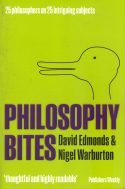
OUP, ISBN 10: 0199576327
Although the number of angels that can stand on the head of a pin may not yet have been verified, we have here twenty-five philosophers who will fit in your pocket, in this handy guide to the state of the art.
A fair amount of ground is covered too, in five regions: ethics; politics; metaphysics and mind; aesthetics; God, atheism and the meaning of life. The groupings seem odd in places: talk of gods is surely metaphysical, and evil is discussed here rather than under ethics, but it’s a start, and there’s lots to do.
The first job, of course, is to sort out what philosophy is, before we begin any adventures in the above regions. We have a harvest of twenty-five responses to that question, so we can get a good overview and soon be on our way. However, if these respondents were twenty-five cooks preparing lunchboxes for our expedition into the unknown, there would be some bitterly disappointed diners come lunchtime.
Three of our helpers just laugh, without offering anything. Many others, like McCabe (“thinking about thinking”), Bradley (“critical reflection on anything you care to be interested in”) and Neill (“thinking that is obsessed with clarity”) fail to distinguish philosophy from, say, psychology, law, art criticism or mathematics. Monk opines that “philosophy is the attempt to understand ourelves and the world”, as if biologists, psychologists and poets weren’t also working on that.
Ready or not, here we go.
Savulescu considers repugnance and morality, and reckons that sex with animals is a waste of time. Blackburn argues that moral relativism is fatally unable to reckon with real moral conflict. Singer raises awkward questions about animals, personhood and suffering. Sandel pushes philosophy out onto the sports arena. Nehamas separates friendship from morality. Appiah argues that cultural differences are best tackled from a cosmopolitian stance. Fricker brings ethics and enquiry together in value-driven epistemology. Phillips advocates multiculturalism without stereotypes. Kymlicka discusses minority rights in respect of new collective identity claims. Brown has problems with tolerance. Moore grapples with infinity. Papineau suggests that approximate truth is good enough for scientific realism. Stroud invites us to feel the force of (philosophical) skepticism. Meller figures that time is tenseless, tense being a relation between a person and an event. Crane points to the confusion in our thinking about consciousness. Williamson clarifies the logic of vagueness. Maltravers demands better reasoning in the art world (good luck!). De Botton, being a novelist, is invited to talk about what he likes in architecture. Smith refreshes the palate with a discussion of taste and judgment in relation to wine. Neill says we can resolve the paradox of tragedy by seeing it as bringing insight rather than pleasure. Cupitt is presumably in the book to remind us that theology is not philosophy. Cottingham seems unable to lead a meaningful life without yearning for spirituality. Law points out the utter unreasonableness of theism given the colossal amount of suffering in the world endured by us and other species, irrespective of human actions. Ward opines that arguments from experience can prop up Eastern idealism. Grayling reminds us of the feebleness of agnosticism, given the blatant improbability of supernatural entities. His suggestion that religions should embrace secularism for their own political survival presupposes more rationality than may be available.
All in all, plenty to bite into, preferably with the help of a bottle of Smith’s wine.
Paul Taylor



